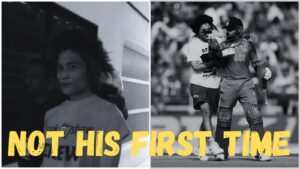 The ‘I Hate When That Happens’ Moment
The ‘I Hate When That Happens’ Moment
‘A collective groan from the audience followed by a couple of disappointed ohs and unconvinced uhms’ – the best way to describe the situation on 10th December inside the dimly lighted screening room during their ongoing film festival at Faculty of Fine Arts, MS University.
It wasn’t lack of enthusiasm that made me wonder whether to skip the day’s event or not, it was fatigue. I had woken up at four in the morning, and didn’t have the good night’s sleep that usually puts me in a good mood. After college, I’d returned home to complete another article for the website. Soon my eyelids begged for a break, and my mind suggested I should crash on the couch. So I did. Told my mother I may not be accompanying her and our neighbor to the screening – it was their first day.
Fortunately, a
twenty minute nap was enough revitalization. I sprang up like one of my Labradors and readied myself for the screening. The brochure informed the guys were to screen Andrei Tarkovsky’s first feature ‘Ivan’s Childhood’. I’d only read about the Russian maestro in Roger Ebert’s review of Solaris, his third feature. He warned the readers, while including the film in the Great Movies Collection, that Tarkovsky was a figure who didn’t care for audience’s tastes or commerical response, and that he loved lingering for an inordinately long time on scenes that many might regard trivial while watching the film superficially. Of course, the critic didn’t fail to add his insight in explaining the possible reasons behind Tarkovsky’s decision, and he went on to elaborate the philosophical elements explored in the film. I warned my mother that Ivan’s Childhood could also be unusually slow.
In India, a film that unnecessarily covers the action from every possible angle using rapid, choppy cuts is deemed ‘fast-paced’ and such movies usually get the best share at the box-office. I invited my mother because she told me once she loved the French films that were shown during an event organized by Alliance France. She brought in her neighbor because a) she needed company and b) her neighbor was one of the few who didn’t mind watching a film that wasn’t in English or one of the Indian languages. I thought it would be best not to invite a close relative, who gave up on the beautiful Ritesh Batra film Lunchbox after merely watching it for twenty minutes because she found it ‘too slow’.
I usually avoided taking my batchmates from Business Administration for such events, being very much aware of their very short attention-span (of course there were exceptions; a new friend of mine is a great film junkie and plans to attend one of the screenings. But another problem is that most of these guys wouldn’t come until each and every member of their ‘group’ was joining – an aspect I find hyper-annoying and needless). My cousin, who is currently studying art history at Faculty of Fine Arts, promised she’d comes once her semester-end exams were done.
In the end, it was just my mother and I, and our neighbor. They started from home way before I did. I reached first! The three of us rushed to the screening room – an open window alerted us that the film had begun. We found seats somewhere in the back, and my neighbor had a tough time reading the subtitles with all the heads blocking the lower part of the screen.
The film ran for about twenty minutes, and one scene was enough to fully engross me into the lives of its characters. The brochure only stated the film was about a child’s experience during World War 2. It did not mention the boy’s character traits. My assumption that the boy would be a completely naïve, timid kid petrified by the calamitous conditions around him proved to be wrong in the first scene itself. Ivan, barely twelve of age, was shown as a rebel and a determined fighter from scene one, pretty much like those spirited youths who displayed a patriotic eagerness to join the Russian army during Napoleon’s invasion of Russia in Tolstoy’s War and Peace, except way younger.
The film is mostly shot in hard light to convey bleaker times. Our angry young tyke orders a much older Lieutenant Galtsev to call Number 51 at headquarters and inform him about his presence. He stands upright besides Galtsev as the latter contacts Lieutenant-Colonel Gryaznov, who instructs him to hand the kid a paper and pen and treat him well. We see Ivan, all covered in dirt and mud, transforming into a handsome lean kid after a bath. The film also shows us a dream in which we see how his mother was killed. After he wakes up, Gryanznov enters the room and hugs him fondly. When the men talk about sending him off to a military school, Ivan immediately rebels, giving ways in which he could help the soldiers during the war. We chuckle when Gryaznov coolly says ‘Right now you’re a pain in my neck’ and Ivan smiles back. The scene then cuts to a romantic subplot involving Captain Kholin and Masha. The guy wooes her in the woods, and she ultimately…
That’s when the VCD stopped playing. The ‘I Hate When That Happens’ Moment. One of the organizers got up and began testing the VCD on other media players. It seemed like the CD was crashing at the point Kholin asks Masha to step away from him after asking her to come close. I asked my mother a few questions about Russia’s part in the Second World War; she’d done her Masters in German language and so knew a bit of its war-ridden history. Mosquitoes were feasting on my naked fingers, something I didn’t realize while the film was playing.
 While trying out the CD, I observed one thing about the film, apart from noting just how wonderfully Tarkovsky is able to box-in his characters in a limited space using wide angle shots and depth, was the neatness and minimalism of the composition in every frame. Look at the image to the right. We see Captain Kholin standing over a trench holding Masha in his arms, his figure right in the center of the frame with one leg on each side of the trench, which forms a V like shape. Tall trees stand behind him, while a fallen one is seen under their legs. I leave all discussion on its symbolism to scholars and simply commend the shot for the way it’s been composed. Part Eisenstein, part Fellini in style, the film has been called a work of ‘socialist surrealism’ by Jean Paul Sartre in his essay. Here is another shot which draws in inspiration from expressionistic art: a shot of Ivan through the jagged beams, which look like they’re about the pierce into the kid.
While trying out the CD, I observed one thing about the film, apart from noting just how wonderfully Tarkovsky is able to box-in his characters in a limited space using wide angle shots and depth, was the neatness and minimalism of the composition in every frame. Look at the image to the right. We see Captain Kholin standing over a trench holding Masha in his arms, his figure right in the center of the frame with one leg on each side of the trench, which forms a V like shape. Tall trees stand behind him, while a fallen one is seen under their legs. I leave all discussion on its symbolism to scholars and simply commend the shot for the way it’s been composed. Part Eisenstein, part Fellini in style, the film has been called a work of ‘socialist surrealism’ by Jean Paul Sartre in his essay. Here is another shot which draws in inspiration from expressionistic art: a shot of Ivan through the jagged beams, which look like they’re about the pierce into the kid.
Sadly, the VCD didn’t work and the one of the organizers announced they would be screening a twenty minute short by Andrea Iannetta called ‘Allah is Great’. There isn’t much information about this short available online, but its plot has been summarised on Gulffilmfest.com: ‘Frank Asmas, a Danish engineer, meets Salim, a taxi driver, when he is on his way out of a remote Indian village to Nairobi. Coming from different worlds, their journey together
results in mayhem.’
 Basically, the sheer coincidence shown in the film is supposed to be the ‘Ah!’ moment each short gives in the end. We are supposed to believe that a bumbling, useless Indian taxi-driver whose cab breaks down twice while taking a Danish engineer to the airport ends us ‘saving him’ from the aircrash of the very flight the foreigner was to travel in, and hence feel grateful for him. The protagonist tries calling him at the end, but he is busy doing namaaz them at the very stop the car broke down. What would he say, had the call been taken “Your inefficiency saved my life! The others who got in time because their cab drivers were pretty efficient died, hahaha!’. This kind of flukish coincidence lacks ingenuity to surprise us in a way we don’t expect and yet accept. If this is God’s plan, then I’d say it’s pretty fractured. And I didn’t like the way the camera unnecessarily cut to a number of objects (including a cockroach, which I guess is a symbolism for something, but I’m not going to give it a thought) in the engineer’s hotel room for no reason whatsoever. After watching twenty minutes of a feature film that’s very punctilious in its framing and composition, I was disappointed to be subjected to a twenty minute short lacking these qualities.
Basically, the sheer coincidence shown in the film is supposed to be the ‘Ah!’ moment each short gives in the end. We are supposed to believe that a bumbling, useless Indian taxi-driver whose cab breaks down twice while taking a Danish engineer to the airport ends us ‘saving him’ from the aircrash of the very flight the foreigner was to travel in, and hence feel grateful for him. The protagonist tries calling him at the end, but he is busy doing namaaz them at the very stop the car broke down. What would he say, had the call been taken “Your inefficiency saved my life! The others who got in time because their cab drivers were pretty efficient died, hahaha!’. This kind of flukish coincidence lacks ingenuity to surprise us in a way we don’t expect and yet accept. If this is God’s plan, then I’d say it’s pretty fractured. And I didn’t like the way the camera unnecessarily cut to a number of objects (including a cockroach, which I guess is a symbolism for something, but I’m not going to give it a thought) in the engineer’s hotel room for no reason whatsoever. After watching twenty minutes of a feature film that’s very punctilious in its framing and composition, I was disappointed to be subjected to a twenty minute short lacking these qualities.
No one clapped at the end. One of the organizers gave an embarrassed side-glance to the main organizer, who was sitting in the last row watching everybody leave in sad silence. My mom and neighbor were dismayed. The evening (their first visit) was a no-show.





[…] Link to Article: http://ourvadodara.in/fest-twenty-first-experience-on-10th-december […]